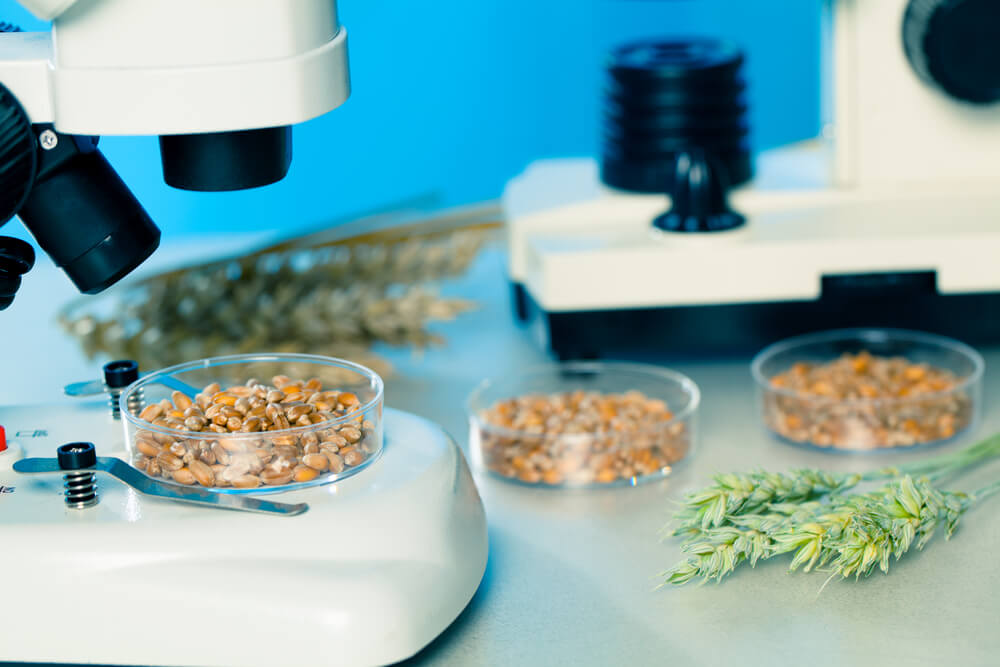Prof. Shimon Gapstein, president of the Kinneret Academic College in an interview with the Hidan website: I discovered the genes in plants that allow them to extend their lives, and provide more fruits, with a longer shelf life. The low water consumption will enable the production of edible plants and fuel in arid areas and solve the food, water and energy crises

Researchers at the Faculty of Biology at the Technion, led by Professor Shimon Gapstein, president of Kinneret Academic College, succeeded in genetically engineering plants that go into "stasis" when they do not receive water for a certain period of time and return and continue their development when the water supply is renewed, without causing damage to the plant. Prof. Gepstein came to the discovery by accident, after he forgot to water for three weeks plants that had been engineered to extend their fertile life, and it turned out in retrospect that the same genetic changes also cause them to consume much less water.
In a conversation with the Hidan site, Prof. Gepstein, a Technion professor emeritus who previously served as the dean of the biology faculty, and as mentioned, as of last year, also serves as the president of Kinneret Academic College, explains
"I started my research trying to deal with the phenomenon of the too fast aging of annual plants. When a field turns yellow and withers, this indicates that its plants are aging, but the field could have been green and the seeds full for a longer period of time, but there is a kind of genetic 'software' in nature - that as soon as the plant produces flowers and fruits (seeds), from an evolutionary point of view, the plant has done its job and it is aging. There is no advantage to him continuing to live."
"From an agricultural and economic point of view, this is not good because the plant ages too early, so I assumed that there is a genetic program that depends on the presence of certain genes, which activate the same aging 'program'. I decided to intervene in the process by way of genetic engineering and prevent the activity of the genes responsible for aging and thus postpone the aging of the plant. Beyond the aspect of bearing more fruit, the same process is also responsible for
Longer shelf life of vegetables and fruits because aging is fast
It also continues in the organ that is detached from the plant."
Prolong the presence of youth (cytokinins). "Basically, we have created a loop here, similar to a thermostat, every time there is a drop in the level of cytokinins, a mechanism is activated that increases the level of the hormone again to compensate for the fact that the plant is trying to grow old," explains Gepstein and adds: "The result is that we have discovered a plant that lives more than twice the lifespan of a normal plant . The normal life cycle of tobacco is four months, but our plant continued to live for eight months and more. During them it continued to bear flowers and fruits, while the normal plant had long since turned yellow and died. We could see this effect also at the shelf life level. When we cut leaves from both plants, the leaves of the normal plant turned yellow seven days later and rotted, while the leaves of the genetically modified plant lasted 21 days without us seeing any change in their green color."
"During the experiment, a malfunction happened by chance. I just forgot to water the plants for three weeks and I saw that these plants don't mind not being watered. When I watered them back after three weeks, a period when normal plants usually die, they continued to develop and gave a crop as if they had not suffered from drought."
Three weeks is a critical period when in many years it rains in the Negev at the beginning of winter, this causes the wheat seeds to germinate. In many cases, the rains stop for several weeks, which results in the elimination of the fields and the declaration of the year as a drought year, intended to compensate the farmers. "In fact, with this technology it is possible to prevent the phenomenon and the plants can go through episodes of dryness that will become more frequent all over the world due to the expected climate changes."

"When I went and tried to check whether the plants could live on less water, that is, with reduced irrigation, I reduced the amount of investment by 70%, I was left with a third of the amount of water that is normally irrigated and the plants continued to live in a normal way without losing the crop.
That's why it gives us a proposal for a solution to the problem of water shortage in the world and for agriculture."
"It will be possible to grow edible plants in places where they are not grown today and also save 70% of the amount of water for agriculture. This will also increase the potential of the areas for agriculture and we will also be able to offer at least a partial solution to the global food crisis that we foresee occurring."
Solving the biofuel dilemma
According to Prof. Gepstein, if the solution he proposes is indeed implemented, it will be possible to go back and promote biofuel projects whose growth today comes at the expense of growing food plants. In my estimation, within twenty years or even less, all cars will switch to biofuel. There will be no choice. Growing these plants in arid areas will solve one of the biggest dilemmas in the world: is it worth producing plants for fuel at the expense of food plants."
In conclusion, Prof. Gepstein says that the discovery has a triple importance for solving the three major crises that threaten us: the food crisis, the water crisis and the energy crisis.

13 תגובות
The guy doesn't understand plant physiology
And all these discoveries are a bluff
Write down what I wrote and talk to me in a few years when he burns all the budgets
dear professor,
I admire your achievements and discoveries. May you continue for many more years.
Oh, yes, and of course the technology of biofuel production will never improve
Of course, the US and Brazilian governments do not understand anything and are promoting the issue only out of a suicidal urge.
Of course, the addition of areas suitable for growing plants does not change anything in the equation of those addicted to slandering governments.
Of course, it is not possible to produce biofuel from algae that are grown in the sea (not at the expense of growing food) or in highly efficient containers that do not damage the areas where food is grown.
Of course, it is absolutely forbidden to use the corn stalks that are grown and produced from them as biofuel - you have to eat them or burn them.
* Typing correction: in no way = because.
"I" is right in all his objections to the use of vegetable fuel (fuel from growing plants instead of food plants). It is a wasteful system that existed for a while only because governments supported it (they supported it - either by subsidizing or by forcing the use of vegetable fuel). The proposal that plants for fuel be grown in areas with little water does not change the negative balance of "growing fuel at the expense of growing food" because this negative balance will be maintained even in areas with little water (if new plants that grow in arid areas are developed).
Making fuel from growing plants is wasteful in terms of the converted energy even if the negative balance I mentioned did not exist (fuel instead of food). This is because plants are "solar energy conversion machines" with very low efficiency: most of the solar energy that falls on them does not become converted energy.
The efficient ways to convert solar energy into other energies is not through growing plants but direct conversions into chemical energy or electrical energy. At the moment there are conversions as if but no efficient way to store the converted energy has been found. The fact that the creation of fuel from plants is proposed is only because in plants there is a ready-made solution to the problem of energy storage: every plant, and especially its carbohydrates, constitute a convenient store of energy for storage and transportation.
All of the above is not in contradiction to the (hopeful) achievement of the research aimed at growing plants in areas where water for agriculture is not always guaranteed. But, as mentioned, you should concentrate there on growing plants for food and not on plants for fuel.
Even if it helps people who are "plants" - they still won't be able to have a conversation
Indeed, the words "I" are annoying (to be gentle).
First of all, biofuel is not a curiosity, it is already widely used.
Secondly, photosynthesis is the most efficient method of absorbing energy from the sun and converting it into chemical energy. It evolved over hundreds of millions of years and most of what we do is burn its products at worst or try to wait it out at best.
The fact that we have not yet learned to use the full potential of all parts of the plant is another matter.
Third thing, evolution does not work for man and therefore has no "interest" in creating what the professor created.
Yehuda:
It's hard to avoid the association of a macabre joke that your words evoke in me:
Maybe it will help people who have reached the "plant" state.
I also allow myself, on that occasion, to sneer at the words of "I" who ignores the fact that his words were answered in the original article and demonstrates nothing but the arrogance of a person who thinks he knows everything (better than everyone else, including professors who express themselves in their field of expertise)
Allow me to laugh, the future in biofuel? After all, growing vegetation for biofuel is about the least efficient form of energy production. Huge areas are needed to get a liter of biofuel and if the world really starts using such fuel we will have to destroy all the open areas on the planet not to mention the huge amount of water needed to irrigate it. There is a reason that the biofuel remains a curiosity, and there is also probably a reason that plants need all the water, otherwise evolution would have already activated the mechanism against dehydration. The only thing I read in the article is the arrogance of the person who thinks he knows everything.
It would be fun if the experiment could be upgraded to humans and double the length of their fertile lives.
Kudos to Professor Gepstein and his colleagues.
So happy to see Professor Emeritus in action, which yields results and fruits 🙂
Nothing less than amazing! Cardinal implications for the future of humanity. inhale